By contrast, Canadians in the U.S. military, and foreigners in the Rhodesian military were enlisted in the regular military or police establishment. They were subject to the same conditions of service, low pay and military regulations as Rhodesian-born enlistees or conscripts. They did not serve in a unit exclusively made up of foreigners, but rather were “folded into the deck” just as the Canadians had been.
Unlike South Africa, Rhodesia did not have Apartheid. The history is complex – let’s just say that some foreigners (including South African nationals) felt far better fighting for Rhodesia than they would have for South Africa .
Rhodesia’s problem was a shortage of educated manpower. The country was the “breadbasket of Africa” with very successful international business and trade. But, like Israel, calling up large numbers of reservists would badly impact the economy. So, reluctantly, the Rhodesian government decided to accept (carefully screened) foreign volunteers.
While a very large number of countries dealt with Rhodesia under the table when it came to trade (including Communist bloc countries), only Portugal and South Africa gave Rhodesia de-facto recognition. They also wanted to keep their manpower for their own guerrilla wars (Portugal in Mozambique and Angola, South Africa in Namibia and later Angola). Fair number of former British soldiers decided to go to Rhodesia. And, being a regular establishment, young, fit, Brits and other nationalities without military experience were able to enlist and be properly trained.
Rhodesia did not have diplomatic relations with the U.S. They did have an “information office” in Washington, D.C. that mostly handed out tourist pamphlets. Except for a small handful, few Americans wound up in the forces until after 1975, when Portugal threw the blanket in its colonies and Marxists took over in Mozambique, which bordered Rhodesia, and Angola.
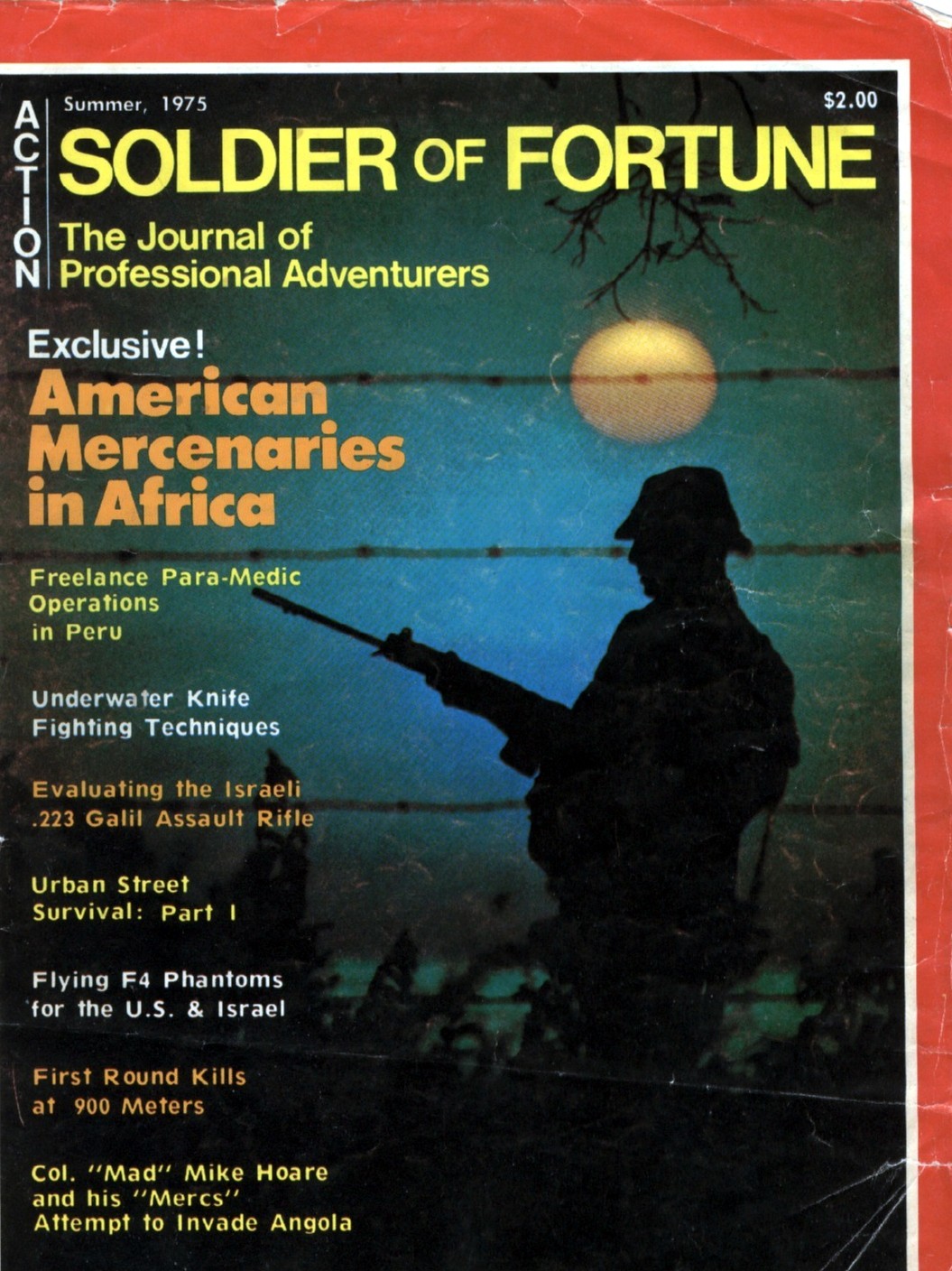
Robert K. Brown, (Lt. Colonel, U.S. Army Reserve, Special Forces Vietnam) visited Rhodesia and decided to get the word out back in the States. U.S. law prohibited recruiting in the U.S. for (non-approved) foreign military. His first issue of Soldier of Fortune magazine had a cover story on Rhodesia and didn’t attempt to recruit anybody. Simply listed the addresses of Rhodesia Army and British South Africa Police (BSAP), a law-enforcement organization with paramilitary capabilities, recruiting offices in Salisbury. U.S. government, even later under President Carter, had to admit that providing information wasn’t legally recruiting.
Those who wrote to the offices were sent packets in the mail containing slick informational brochures, information on applying, and application forms. Reasonable hoops set up to hopefully separate the wheat from the chaff.
Say you decided to apply. You would have to fill out an application form. If you were prior service you would have to include copies of your DD-214(s). They required a “police clearance letter” from your State Police attesting that you had no criminal record.
This raised two potential problems. First, some states (like Washington) had only a highway patrol state police with no routine criminal functions except organized crime. So you would go to your county police, get the letter, and explain to the authorities in your cover letter why you had to do so. They quickly adjusted – though a country with only one police force had trouble adjusting to the fact that the U.S. had maybe 24,000.
The second issue was that normally you could not just ask for a police clearance letter. Law generally restricted those to inquiries from employers who had authorized access like security firms and the like. If you could just trot down there and get one, bozo employers would make you do so as a condition of employment and circumvent the privacy laws. But there was a loophole: If you went in and told them that it was for a visa, they would charge you maybe $10. fee and give you the coveted letter.
Official high school and college transcripts were also required. Aside from wanting quality applicants, your education level could determine your entry monthly pay. Moreover, three medical documents were required: A form for you to take to a civilian physician who would examine you, at your expense, a dental exam, and an X-Ray for TB.
You also had to have two letters, from responsible people (for instance, teachers, professors, former commanding officers, employers, etc.). Then, you had to fill out a detailed history of your life, starting at the high school level. You had to attest to not having significant debts or “impediments” such as children that would make your serving at such relatively low wages unrealistic.
Two passport size photos and – in the case of the BSAP – a 1200 word handwritten summary of your life, goals. Mercifully, I was already in-country and had powerful endorsements, one from a high government official, and one from a BSAP Commissioner (think General). I didn’t have to do the handwritten thing, otherwise, they would have shipped me back to the States – surface mail… six weeks…air-holes if you were lucky).
If you sent off to the BSAP you would almost certainly be rejected out of hand. The Superintendent (think Major) in charge of such matters had a case of the Red Xss regarding Americans going back to WWII and while he couldn’t prevent some in-country from joining he could choke off the foreign procurement of Americans. BSAP was not aware of this until he retired not long before I got to Rhodesia.
The Rhodesian Army had its own Major running their foreign volunteer office, Nick Lamprecht, who was far more rational. He had subordinates screen out the rubbish and he would look at the quality submissions himself. You made the cut and he’d send you a conditional acceptance offer.
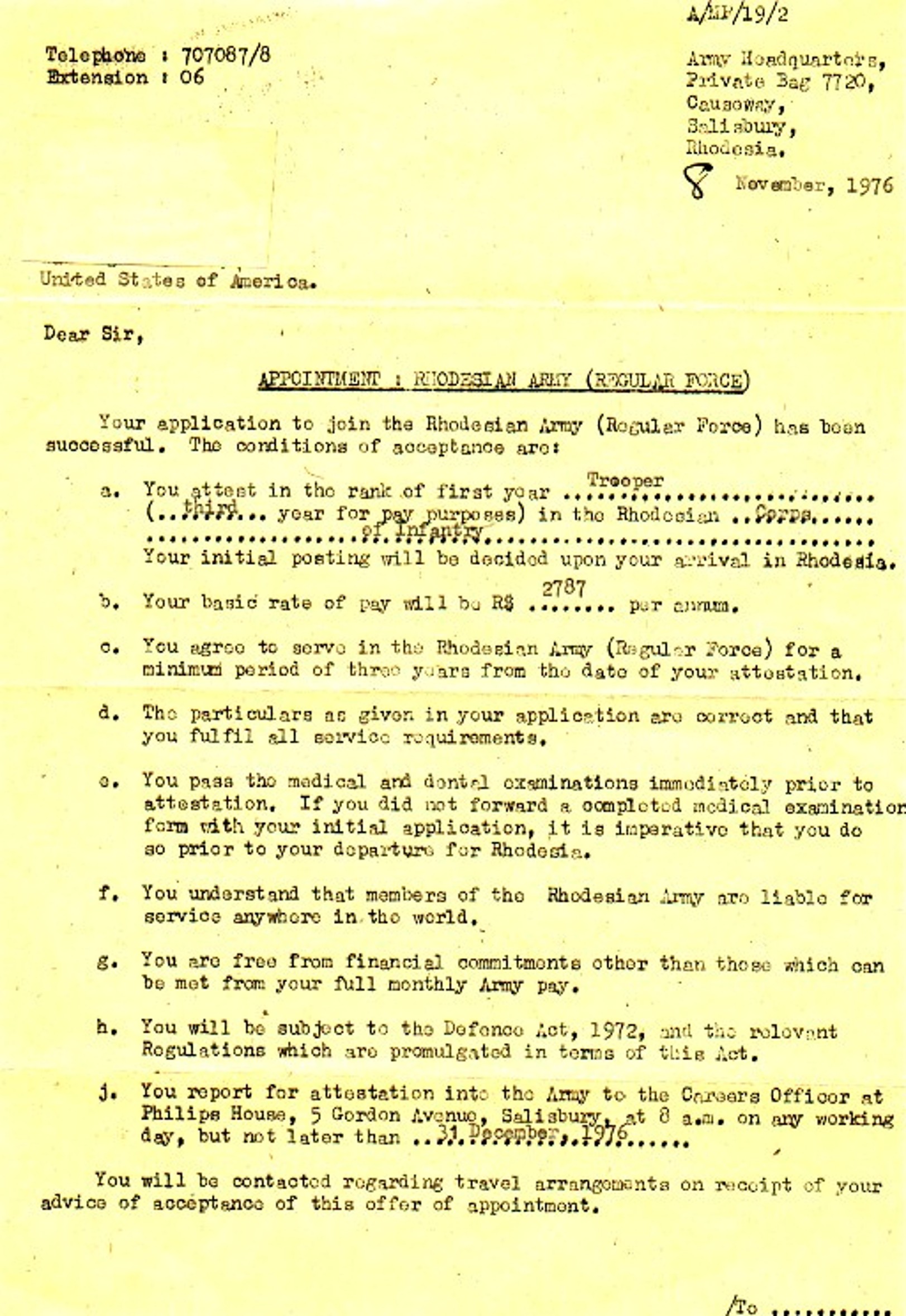
Sometimes there was a guarantee of reimbursement of airfare if you qualified and served out your contract. But that varied.
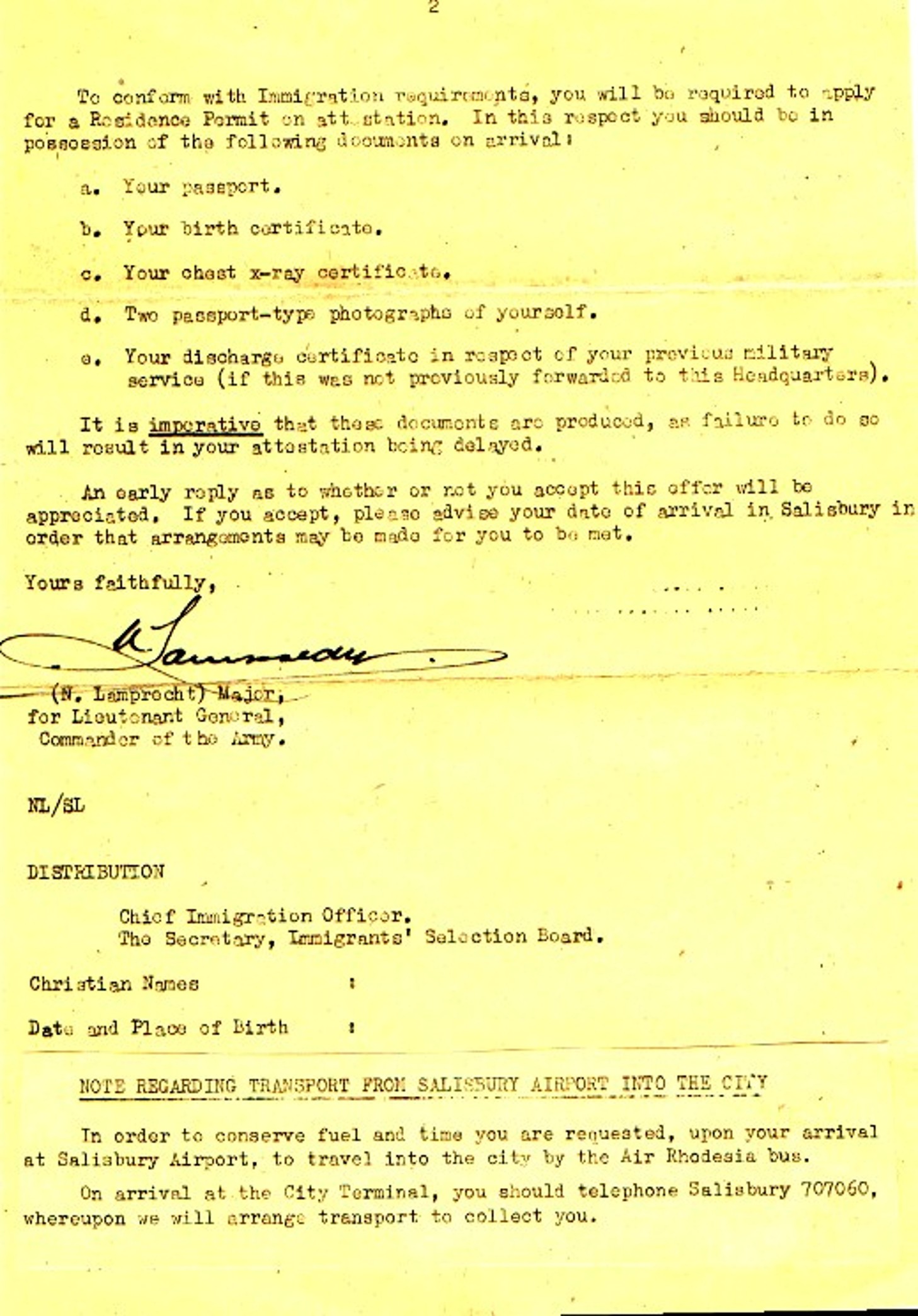
Colonel Brown arrived in Salisbury in 1976 on another trip to see what the effects of the article and the applications might have been. He was full-tilt behind Rhodesia but, almost comically, the Rhodesian government had some serious doubts. While he was treated with courtesy by every official that he met, he was also shadowed by Special Branch (sort of like the FBI of the BSAP).
During the wars in the Congo in the 1960s, many mercenaries had been recruited from South Africa and Rhodesia. At the moment Angola was still a “thing” and though the impotent mercenary presence had been destroyed, it appeared that a fresh effort might be made. And the Rhodesian government was worried that Col Brown might be in-country to recruit mercs for another go at Angola – and the country could not spare the manpower. Eventually, they settled down and worried about things of vastly more import.
The screening program produced far better material than the increasing numbers that simply showed up at the airport, many with dubious backgrounds and character. By 1977, the Rhodesian military team at the airport gave all such unvetted arrivals a very “rough and ready” work-up. If they didn’t have the majority of the important paperwork (DD-214s, etc.) maybe some three out of four would not be permitted to leave the airport except by the first available outgoing flight.
Around some 300 Americans served in the Security Forces during the bush war. A handful employed as “fence guards”, “range detectives,” essentially civilian security for farms and ranches. Some Americans may have wound up in the “Guard Force” which was an adequate group that provided security to the Protected Villages. Assigned to Internal Affairs counted as military service.
Along with the Americans, there were Brits (largest foreign group), Canadians, Australians, Belgians, at least one Israeli, some South Africans who could not stand their country’s Apartheid policy but were determined to fight Communist insurgents, and even a Selous Scout captain from West Germany who received the country’s highest decoration for valor.
Most Americans worked out. Some were splendid. One lost his legs to a mine and remained in the country to attend medical school. Some, like the jewel thieves of the introduction, did little to add luster to the American volunteer reputation.
As a whole, the Americans were a bit of an oddity. English speaking but not from a Commonwealth country. While an all-American unit was never formed, most Americans flocked to the elite Rhodesian Light Infantry (RLI).
One American, looking back on those days said, “All of the foreign volunteers may have, to some degree, regarding their personality, not their performance, marched to their own drummer. But the Americans brought their own orchestra.
This article was written by Yankee Papa.

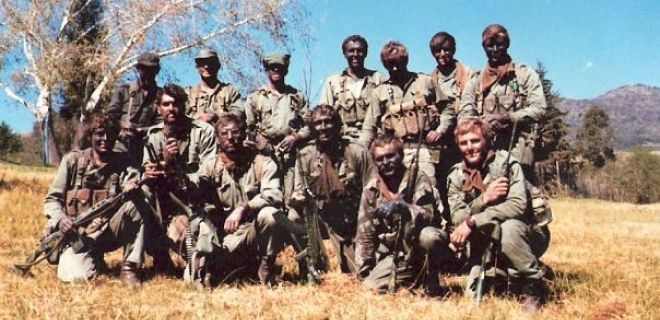
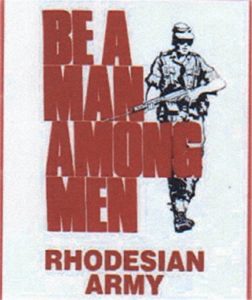









COMMENTS